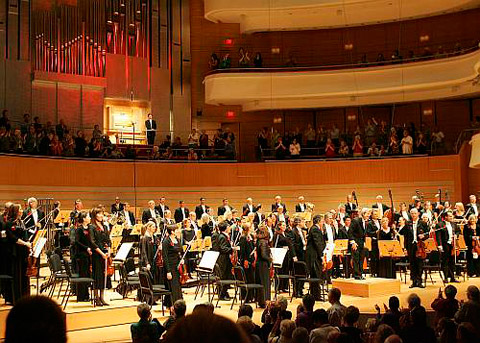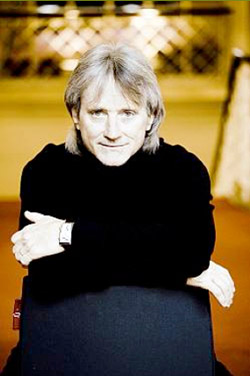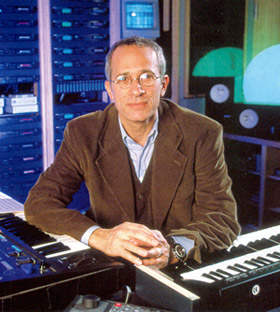

  |
|
|
||||||||||||||||||||||
|
FMS FEATURE... March 3, 2009 American Composers Festival Shines for Pacific Symphony Programs enlighten crowds with composers' works that straddle film, concert worlds by Jon Burlingame  This year's festival theme was "Hollywood's Golden Age," referring to film music by Erich Wolfgang Korngold, Miklos Rozsa and Bernard Herrmann, but its concept was broader in the sense that concert music by all three was also presented, and that contemporary composers – James Newton Howard and Paul Chihara – were also featured during its five-day run. As festival artistic advisor Joseph Horowitz explained, "We want to take a second look at these great film composers, now that we're no longer prejudiced against them – in particular, a second look at Bernard Herrmann whom we are presenting as one of the major american composers of his generation. And we are very systematically looking at the differences between concert and film music in the case of composers who write for film."  Carl St.Clair In fact, "I Will Plant a Tree" – inspired by a Martin Luther quote about planting an apple tree despite the imminent end of the world – is an important new orchestral work that, one hopes, will have a life beyond these initial performances. In describing the piece, the Los Angeles Times used phrases like "atmospheric shimmering... musical style, harmonic and timbral," while the Orange County Register spoke of its "arch of beauteous simplicity and wonder, through strenuous upheaval and back again." The delicate opening of the work suggests the promise and optimism of childhood. The piece gradually becomes more dramatic and powerful, although the conflict of the middle portion ultimately subsides, returning to the quiet ambiance of the beginning. As Howard said – in explaining the piece during an interview in early February – he incorporated "a vaguely autobiographical element." But, he added, "what really matters to me, as I'm getting older, is the idea of reclaiming the optimism and grace and positivity that a child has. That constitutes a tremendous personal challenge, and if you succeed, a wonderful spiritual victory."  James Newton-Howard Howard introduced a clip from his most recent film, Defiance, noting that director Edward Zwick often makes music a significant contributor to any film (as in their previous collaboration, Blood Diamond). St.Clair conducted (without the aid of click track) an eight-minute piece from the score that featured violin solos by concertmaster Raymond Kobler. Horowitz introduced the concert's second half with a clip from the opening of Kings Row designed to demonstrate Korngold's use of classical structures within film scores – in this case, a theme, three variations and a coda as we are introduced to the characters as children. St.Clair then played a nine-minute suite from various parts of the Kings Row score. Rounding out the concert were two Rozsa pieces: The 11-minute "Theme and Variations for Violin, Cello and Orchestra," op. 29a, originally written for Jascha Heifetz and Gregor Piatigorsky (and played by Kobler and cellist Timothy Landauer), and "Parade of the Charioteers" from Rozsa's Oscar-winning Ben-Hur score. At Saturday's performance, St.Clair introduced the composer's daughter and granddaughter, Juliet and Nicchi Rozsa, who were present in the audience. An abbreviated version of the program was performed Sunday afternoon, and on Monday the attention shifted to music for smaller ensembles, including Rozsa's "Toccata Capricciosa for Solo Cello" (played by Landauer) and Korngold's "Five Songs for Baritone and Piano," op. 38 (James Schaefer, baritone) which were, in part, derived from the composer's film music. Also performed was Herrmann's clarinet quintet, "Souvenirs de Voyage," termed by Horowitz "a major American chamber work that is virtually unknown... the great discovery of the festival." And Paul Chihara – who divides his time between concert music and film music (including such Sidney Lumet films as Prince of the City) – introduced his Minidoka for clarinet, viola, harp and percussion. The piece – a memory of his youth in an internment camp for Japanese-Americans during World War II – derived in part from his score for the 1976 TV-movie Farewell to Manzanar, about the same subject. ©2009 Jon Burlingame |
Search
Past Features
Feature Archives
|